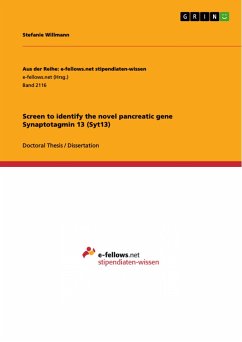Doctoral Thesis / Dissertation from the year 2016 in the subject Biology - Developmental Biology, grade: bestanden, Technical University of Munich (IDR), language: English, abstract: The pancreas is a compound gland which regulates nutrition homeostasis in mammals. Impairment in the Insulin-producing beta-cells of the pancreas will lead to either type 1 or 2 diabetes. We focused on pancreas development, as the different lineages of the pancreas segregate. In the mRNA screening approach during the so-called secondary transition of the pancreas, we identified known and novel pancreatic genes. Thus, faciliating the understanding of pancreatic signaling and lineage determing factors. Furthermore, the novel pancreatic-related candidate gene Syt13 was analyzed for localization and function in the pancreatic gland, highlighting endocrine lineage commitment and ß-cell development. Der Pankreas ist ein komplexes Organ dass für das Ernährungsgleichgewicht im Körper wichtig ist. Beeinträchtigungen in den Insulin produzierenden beta-Zellen des Pankreas führt entweder zu Typ1 oder Typ2 Diabetes. In der Entwicklung des Pankreas entstehen die unterschiedlichen Verzweigungen des Pankreas wie azinare, duktale und endokrine Zellen. In einem mRNA Screening Ansatz haben wir in der sekundären Transition, in der sich die unterschiedlichen Linien des Pankreas aufteilen, bekannte und unbekannte Gene identifiziert. Dabei haben wir das Gen Syt13 weiter analysiert in Bezug auf Lokalisation und Funktion im Pankreas. Die bisherigen Experimente zeigten einen Zusammenhang zwischen Syt13 in der Aufspaltung in endokrine Zellen und in der Reifung zu ß-Zellen [...]








